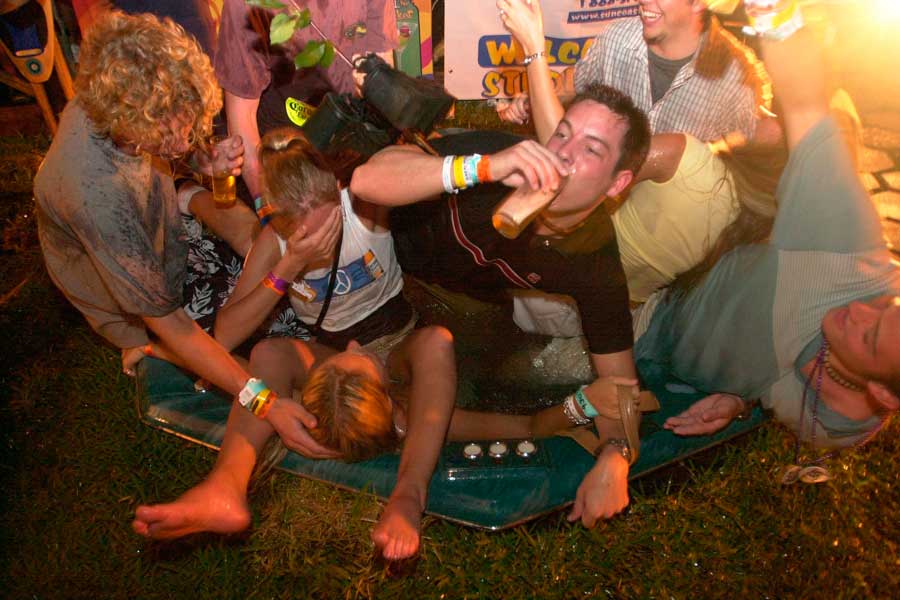Words of Wellness: Why Is Alcohol Binging Such A Big Deal?
In honor of Alcohol Awareness week and inspired by the Vermont Conference on Addictive Disorders that I recently attended, I thought I’d take a closer look at Alcohol Issues, particularly for those typical of College and High School Students who are under 25 and for those who drink heavily, when they drink. What makes this issue interesting to me? Binge drinking in young people is causing long term brain damage in the hippocampus and the white matter and is also along with Cannabis use impairing the development of normal neuro-pathways between the Prefrontal cortex – the “smart brain” that regulates the intensity and impulsivity of the Limbic system or “emotional brain”.
The impacted brain development takes place starting in the Limbic System which is very active in the teens and early 20’s in order to facilitate and reward learning, especially as it relates to what should be feared and what need not be. Lots of new neural connectivity is happening in the teen years and also simultaneously, there is some reduction of the availability of dopamine in the nucleus accumbens, meaning that in order to not feel bored and bummed out you need really exciting things to be happening or you feel like you’re dying from boredom. Alcohol or any drug or behavior that makes you feel good or excited, activates this dopamine pathway – resulting in the “feel good” that is then very easily sensitized as a learned experience – neurologically speaking, which is the basis of continuing the behavior biologically. This is normally an essential biological aspect of learning – it was good? Do it again! It is also the biological basis of many less than good compulsions, especially when the prefrontal cortex isn’t sufficiently developed and activated to be able to regulate them. Unregulated compulsions are classically part of the anxiety disorders spectrum and are also the biological basis of addiction. Isn’t it interesting then that classic alcohol withdrawal includes shakes, sweating, high blood pressure, depression and anxiety.
Anyway, at about age 20 or so, significant neural networking and pruning between the prefrontal cortex and the limbic system is fine tuning and finalizing those major neuro superhighways or learned responses that regulate emotions, motivational drive, spatial memory and sets the hedonic tone for the level of vigilance of the adult sympathetic nervous system. Good studies are demonstrating that if a young person is drinking (or smoking pot) a lot they are impairing this neuro-development.
What’s that mean? It means that a person may feel flat, depressed and or anxious without some form of enhancement from alcohol or a drug; that they are likely to have a more difficult time feeling their feelings, understanding and controlling their feelings; struggle with impulsivity and maintaining their attention span; and having good access to recall, memory and difficulties with learning – both physical and kinesthetic.
After 25, if a person was not using substances intensely or heavily or chronically, they can count on having the advantages of substantially larger hippocampi, and larger prefrontal cortices. They can still damage their brains like any other alcoholic or addict if they take on years of heavy use at that point but they at least have the advantage of perhaps the common sense structures to increase their resilience, native intelligence and function – life long.
Neurological Harm Reduction Summary
Wait till you’re over 25 to drink or smoke pot. Right…. So then –
If you drink alcohol, drink in moderation: 1-2 standard drinks/ day – don’t binge drink – studies show brain damage occurs with just 1-2 regular binging episodes a week.
Skipping drinking days and only drinking 1-2 will keep your tolerance low – you’ll feel your drinks but won’t be as intoxicated or take as long to come down.
Don’t chug or drink quickly, which is the major cause of blackouts – because of the toxicity to the hippocampus.
Avoid shots of liquor because of the rapid absorption of highly concentrated alcohol. Stick to lower alcohol content choices.
Eat before and during drinking to slow the absorption of alcohol.
Drink water or other hydrating liquids between drinks to lower blood alcohol concentration and prevent hangovers.
Regarding pot – smoke less than once a week and not more than a little once that day.
Make sure your weed isn’t chemically enhanced or smoked in a way that adds additional toxins.
Know which cannabinoids: THC & CBG’s your pot was grown to activate. Some cause more anxiety and others much less.
And a note on self-care – I find when people don’t care about their wellbeing it is usually because they are naive and don’t know about the risks they are engaging or they are a bit (or a lot) depressed and hence – don’t care. Anyone can feel like that from time to time and very few of us maintain perfect self-care regarding everything: sleeping, eating, exercise, attitude, stress management, time management, relationship management, work/school responsibilities and balancing it all. Hopefully, when we’re not caring for ourselves we have people there who care about us till we can get back to caring better for ourselves. We often care for others better than we do for ourselves when things are challenging. If things are getting difficult and you need support beyond your regular peeps – reach out!
Also – there is a new drop –in group on campus for anyone feeling impacted by alcohol & drug use whether it’s your own or someone else’s: Thursdays 4:30-5:30 at WLLC 212. There’s coffee, cookies and good people there.





